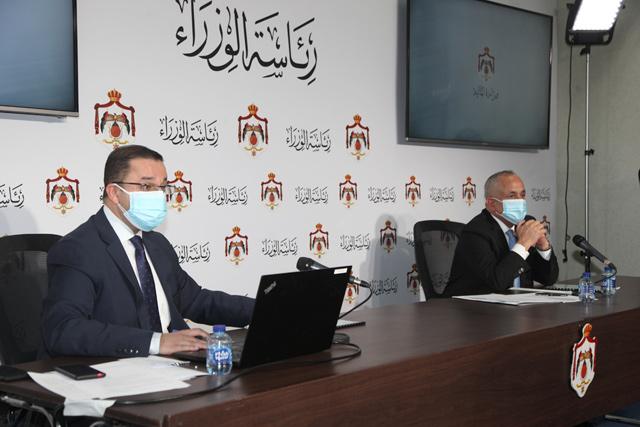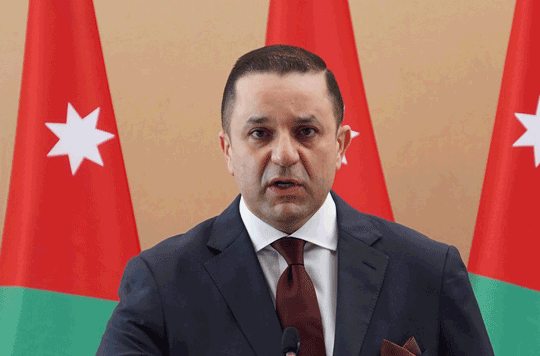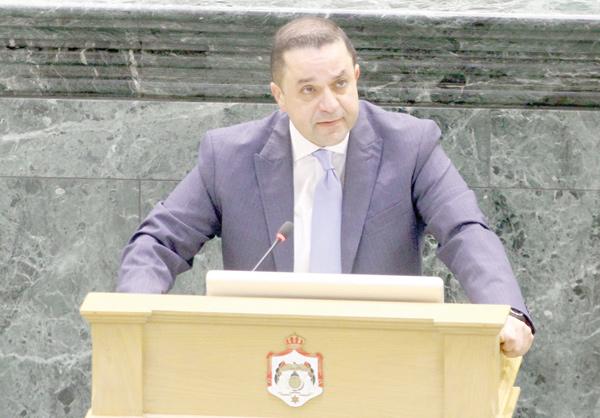You are here
IMF: Jordan to reap from ‘tough’ response to virus, fund ready with support
By Mohammad Ghazal - Apr 17,2020 - Last updated at Apr 17,2020

The International Monetary Fund's Chief of Mission to Jordan Chris Jarvis and Minister of Finance Mohamad Al-Ississ speak during a joint virtual interview with The Jordan Times on Thursday (JT photos)
AMMAN — The International Monetary Fund (IMF) is ready to provide Jordan with support through its Rapid Financing Instrument, IMF Chief of Mission to Jordan Chris Jarvis said on Thursday, noting that the Kingdom’s tough measures to contain the coronavirus will pay off in the coming weeks and months.
“Jordan was completely right to take tough measures early on. The government acted fast and with determination in response to the coronavirus, and in the IMF, we are trying to put those same principles into effect in our own actions in relation to countries,” he said in a joint virtual interview with The Jordan Times along with Minister of Finance Mohamad Al-Ississ. (See text of interview)
The mission chief predicted that the Kingdom’s quick response to the pandemic “will really benefit Jordan over the coming weeks and months”.
During the interview, Jarvis expressed his confidence in Jordan’s ability to recover, as the government “has already done a lot in terms of structural reforms”.
“A lot of my confidence in Jordan comes from the fact that we're working with partners who've already shown that they are capable of taking action,” he said.
The IMF’s programme with Jordan is not the fund designing an adjustment programme and giving it to Jordan, he said. “Jordan has its own adjustment, has its own measures, and it is a good partner with the fund,” Jarvis said, adding that the IMF will help Jordan garner further international support.
“It's possible that the crisis in Jordan will be over earlier than other countries because it has done such a good job of containment,” he added, noting that the IMF will “certainly be flexible” in reflecting on the effects of the crisis, which is “beyond Jordan’s control”.
Jarvis, who said that the first review under the new programme is expected in September or October of this year, noted there is “no need for delaying reforms at this stage” and that fiscal targets will be revised automatically to allow for more spending on health and containment of the virus.
The actions that countries take will affect what the outcome is, he told The Jordan Times.
The IMF will continue to stand beside Jordan and “we will continue to work to give the best advice we can to the Jordanian government and to encourage others to give Jordan the support it needs”, he said.
Although Jordan’s economy is expected to contract this year, like many other countries across the world, it is expected to rebound as of 2021.
At this stage, the first priority should be dealing with the virus itself and giving priority to health spending and measures to contain the virus, which is an essential condition for both saving lives and for getting the economy going again, Jarvis said.
“Jordan must make sure that the most vulnerable people are supported through transfers and social spending, which I know is on the priority list for the government,” he noted, adding that it is “very important” to make sure that solvent businesses are preserved through the crisis and that “you don't let a shortage of liquidity turn into a major problem”.
The spread of the coronavirus will not stop the reform process in Jordan, but rather, will expedite it, Al-Ississ told The Jordan Times.
Stressing that Jordan will continue to service its debt and honour its external obligations, the minister noted that this is important to maintain the confidence of the private sector and reassure that Jordan can move beyond the immediate crisis.
The international community’s support to Jordan is “crucial” the minister said, stressing: “We need to see them move fast and not wait until the crisis worsens.”
He added that multilateral support in combatting the global pandemic is “very essential”.
“As the entire world is impacted by the coronavirus, recapturing the momentum for growth should be our foremost priority. The sooner we can rebound from that, the less the negative impact of the crisis will be. Therefore, while we are working around the clock to counter the health impact of COVID-19, we are also working on ensuring that we can recover economically,” he said.
The government’s top priorities at this stage include making sure that the health apparatus and other security apparatuses have whatever resources they need to do their work, in addition to expanding safety nets for daily wage workers and other vulnerable groups.
The government will continue to pay public sector wages in order to maintain spending ability, “even if we have to trim some parts of it to make sure that we can continue to do that”.
The way ahead is not going to be a walk in the park, he said.
“It will not be easy for anybody. We have fewer resources dedicated and we're being distracted by having to firefight. Having said that, we would be really failing to capture the warning signs that this crisis sends us if we don't work on structural reform in parallel,” said Al-Ississ.
Some parts of the programme will have to be rethought or delayed, but the fundamental pillars of the programme are what Jordan needs at this point to enhance its ability to withstand this global shock, according to the minister.
Jordan will reprioritise expenditures, the minister said.
“What we know from previous economic downturns that the world has faced is that you should not exacerbate the problem by further cutting expenditures. It is important for the government to play a role in helping adjust and slow the virus-related impact. Having said that, our revenues have also taken a negative hit, and so we will need to redirect expenditure towards the most vulnerable through safety nets,” he added.
Stressing that the government will work with the private sector to increase resilience in the face of the crisis, he said: “We cannot afford to stop being ahead of the curve with our approach.”
Jordan has had to withstand more than its fair share of external and exogenous shocks over the past decade. “We have always learned to adapt and to adopt new ways of doing business.”
“We have a very good partnership with the fund and other developmental partners, which gives me confidence in the ability of Jordan to move past this.
“We need to respond to the needs of markets. We came very early on with a package of economic decisions, such as lowering Social Security and delaying customs and tax payments, and the central bank has also done a tremendous job,” added the minister.
Jordan could be one of the first countries whose economy becomes functional again due to its steadfast fiscal measures, Al-Ississ said.
Related Articles
AMMAN — The government has endorsed the 2021 state budget with an estimated deficit of JD1.180 billion, accounting for 3.7 per cent of
AMMAN — Jordan's GDP is projected to grow by 2.7 per cent, as inflation is expected to narrow to 3.8 per cent in 2023, Finance Minister Moha
AMMAN — The government on Sunday presented the 2020 draft state budget law to the Lower House, with an estimated deficit of JD1.247 billion















